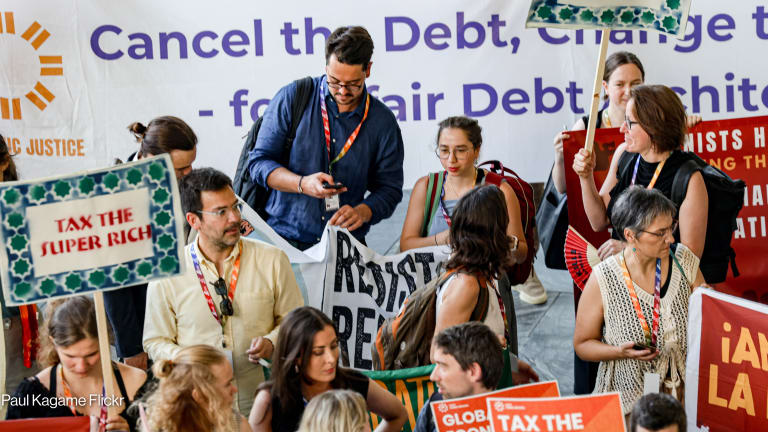
Last week’s announcement that the U.K. Department for International Development is to be merged with the Foreign & Commonwealth Office is devastating news for the development sector — and for the world’s poorest people, including those in our country, Tanzania.
What Boris Johnson's speech reveals about the future of UK aid
The prime minister's speech raised several red flags about how official development assistance will be used by the new Foreign, Commonwealth and Development Office.
As development practitioners here, we are particularly alarmed that U.K. Prime Minister Boris Johnson singled out Tanzania and Zambia as countries that don’t serve British interests and are therefore less worthy of aid.
The news was covered by Tanzania’s media outlets and discussed widely on social media as well. Interpretations of the announcement varied, but for many people, the direct connection to the reduction of development support to Tanzania was especially alarming.
Some people have linked the move with Tanzania’s poor performance in democratic governance or failures in our COVID-19 response. Others, like ourselves, are left questioning the U.K. government’s assessment of what constitutes British interests.
We believe the move is shortsighted, as there are global benefits to providing humanitarian aid to developing countries like Tanzania. A glaring example of this is the current coronavirus pandemic. A unified global response to the pandemic is in everyone’s interests, including the U.K.’s, if we are ever going to beat the virus.
The timing of the announcement is generally staggering. We are in the midst of a global pandemic. This is not the time for the U.K. to be backtracking on its commitments to fight poverty around the world.
We were also shocked to see the U.K. so obviously link humanitarian aid with political interests. The prime minister knows that Tanzania is a country with high rates of poverty, and questioning the usefulness of aid is very insulting. It’s hurtful to place political interests above the needs of our people. DFID was created in order to tackle high levels of poverty. This announcement marks a very worrying shift away from helping the world’s poorest and most vulnerable people.
The feeling here in Tanzania is that the gains we have made will be lost. According to World Bank data, the proportion of the population living on less than $1.90 per day has dropped dramatically but is still around 50%.
We also haven’t achieved gender equality in Tanzania — no country has. Women still need to receive equal pay, and there need to be more women in decision-making roles. There’s still a lot of work to do, but taking aid money away will mean very many steps backward.
In Tanzania, DFID has supported some impressive poverty reduction efforts. It’s incredibly concerning that this support could be coming to an end.
Right now, for example, DFID is supporting programs on government accountability to create an inclusive financial sector in Tanzania where the government is accountable in responding to the needs of savings groups, whose members are mainly women engaged in agriculture and small-scale trading. This program will make a massive difference to 150,000 savings groups around the country.
And in terms of the climate crisis, Tanzania really is at the sharp end, with increasingly erratic and extreme weather, including floods and droughts, making it difficult for people to grow crops to feed themselves and their families. In response, DFID is implementing a nutrition and climate resilience program, working with farmers to help them become resilient to climate change through good agricultural practices such as climate-smart agriculture, soil and water management practices, and use of high-yield, drought-resistant crop varieties.
It’s hurtful to place political interests above the needs of our people.
—Countries like Tanzania need more funding, not less, to support rural farmers in adapting to a climate crisis they played no role in creating. It’s so important that countries like this receive support in dealing with climate impacts, through obligations under the United Nations climate convention.
Many commentators have said that it’s the poorest and most vulnerable who will suffer the most from the U.K. government’s decision, and this is very much true in Tanzania. In recent years, Tanzania has made great strides in poverty reduction and continued economic growth. This is positive news, but according to the World Bank, a large proportion of the population remains vulnerable to falling back into poverty. Our work as a sector is far from finished.
But the prime minister didn’t single out Tanzania as a country that will receive less aid because of the advances we have made in reducing poverty. It was because the U.K. government believes humanitarian aid in the country isn’t serving its interests. We are very worried.









